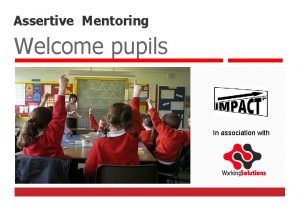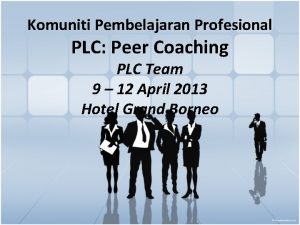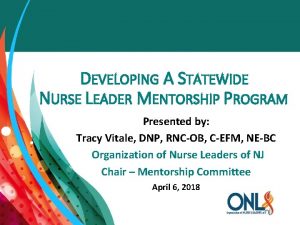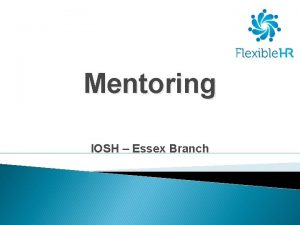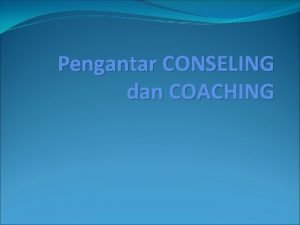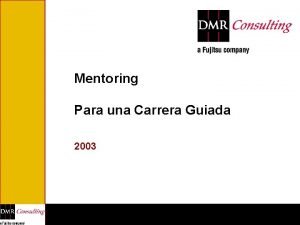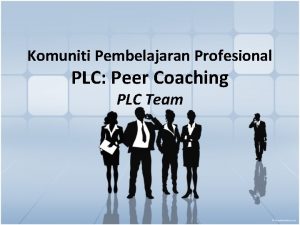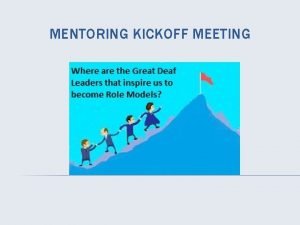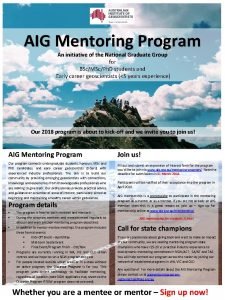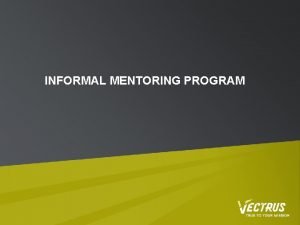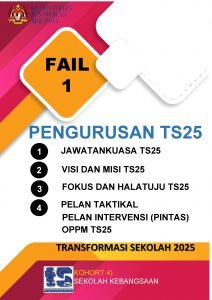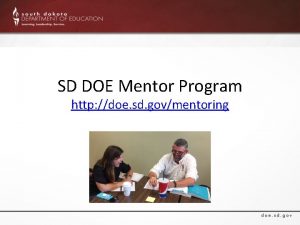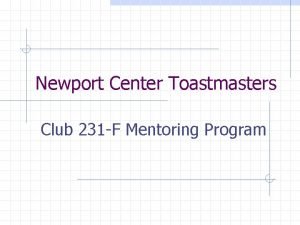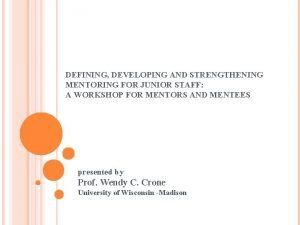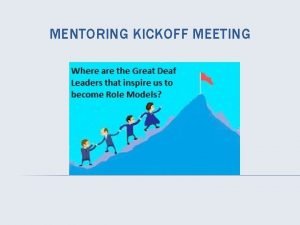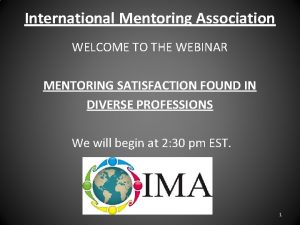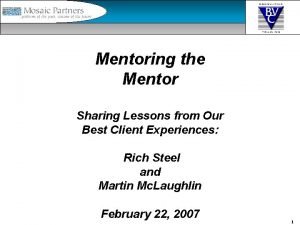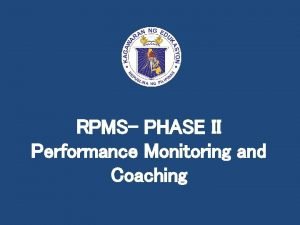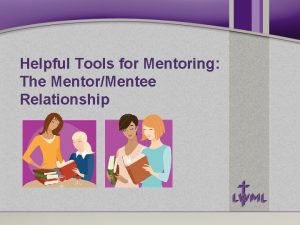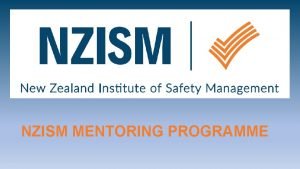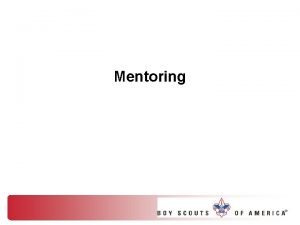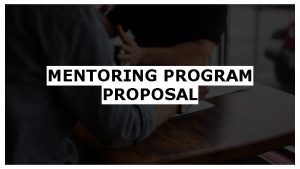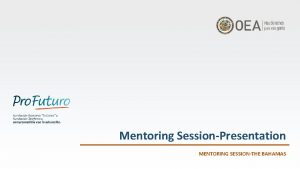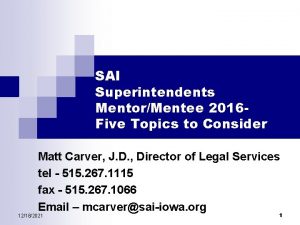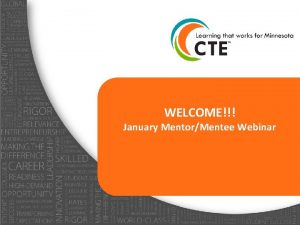Mentoring How to Create Effective MentorMentee Networks Emelia


































- Slides: 34

Mentoring How to Create Effective Mentor-Mentee Networks Emelia J. Benjamin, MD, Sc. M No industry relationships to disclose 2 R 01 HL 092577 N 01 -HC 25195 1 P 50 HL 120163 01 – FDA & AHA

Mentoring You are the Expert • How many people have a mentor? • How many people are a mentor?

Mentoring Learning Objective • By the end of session all participants develop and commit to 3 ways to enhance their developmental networks

Mentoring Session 1. What are the value and roles of mentors? 2. What are strengths & opportunities to improve your mentor network? 3. What are barriers / challenges to effective mentoring relationships 4. Develop and commit to 3 ways to enhance your developmental network

What is a Mentor? Domains Value

What is a Mentor? Domains Role Model Ethicist Content Personal Strategy Coach Sponsor Networker Booster Value Inspiration Moral compass Expertise Work-life integration Political management Foster realistic self-appraisal & independence Advocate in the system Connecting to collaborators Cheer-leader

Developmental Network Is your Network Robust • Size – How many developers? • Diversity – Is there variety in your network? • Density – How interconnected is your network? • Tie Strength – How intimate are your connections? • Multiplexity – How many types of support do developers provide? ©Kathy Kram 2014

Mentoring Dimensions • • • Formal • • • Informal Episodic • • • Relational Hierarchical • • Peer Functional • • Broad-based Career • • • Psychosocial Dyadic • • • Network Vicki Parker, Ph. D 2012

Self- & Peer-Mentoring Good Questions to Ask 1. What do you want? 2. How are you responsible for this situation? 3. If you knew you could not fail, what would you do? 4. What are you afraid of? 5. If you knew the answer, what would it be? 6. What is hardest or most challenging about this situation? 7. What is the best & worst that could happen if you do…. . ? 8. What will you say “no” to in order to say “yes”? 9. What do you notice in your body right now? 10. What do you know to be true? 11. How are you getting in your own way? 12. What else? Kathy Kram 2011

Developmental Relationships • What are the strengths of & opportunities to improve your mentor network? – 3 strengths – 3 opportunities ©Kathy Kram, 2014

Potential Benefits of Mentoring For Mentees For Mentors ©Kathy Kram 2014 For Organizations

Potential Benefits of Mentoring For Mentees For Mentors Career/job satisfaction Salary Promotion Job performance Self-confidence Clear professional identity Optimism New Knowledge & Skills Lower stress Less work-family conflict Cultural Adjustment Career/job satisfaction Generativity Salary Promotion Job performance Reputation Employee loyalty Organizational commitment New Knowledge and Skills Cross-cultural Learning ©Kathy Kram 2014 For Organizations Talent management (succession planning) Retention Recruiting Performance Stronger Networks Social equity and diversity

Programming for success Primary mentor(s) • Finding a mentor – How do you do due diligence?

Programming for Success Due Diligence on Potential Mentor • Reputation – With your prior advisors/mentors • BU Profiles – Publications • Web of Science Author Finder • Google Scholar • Cited in Reviews? – Grants • NIH Reporter • Check out prior mentee’s experience – Independence – Publications & Grants – Well-being

Programming for Success Mentor Network • Opportunities for Networking

Programming for Success Mentor Network • Opportunities for Networking – National meetings – Local meetings – After presentations – Posters – Anywhere

Programming for Success Mentor Network • Strategies for Networking – Mentor introduction – Make connection based on place/topic – Email before event and create connection • Clarify intention/expectations (be limited) – Plane – Taxi – Play chauffer – Walk them to next meeting/office/car – Business cards – NIH bio sketch – Informational interview; make them feel good

Mentoring Triumphs & Tragedies Reflect on your best & worst experience as a mentor or mentee. • What made it work when it worked? – What did you learn? • What elements were unsuccessful? – What did you learn?

Obstacles to Successful Relationships ü ü ü Unclear or unrealistic expectations Time pressure Poor interpersonal skills Difficulty with feedback Managing differences § nationality § gender § race ü Organizational context § politics § change ©Kathy Kram, 2014

Strategies for Improving the Quality of Developmental Relationships • Follow the 5 Relationship Principles – Active listening – Curiosity – Feedback – Self-management – Accountability • Do not rely on great chemistry and identification; it takes work to build a good relationship • Treat the relationship as an opportunity for mutual learning ©Kathy Kram, 2014

Programming for Success Primary Mentor(s) Mentee’s Job

Programming for Success Mentor(s) Mentee’s Job Articulate expectations Agenda • Topic, timelines, deliverables Meetings • • • Frequency Length Scheduling Communication preferences Respect mentor’s time Confidentiality

Programming for Success Primary Mentor(s) Mentor’s Job

Programming for Success Primary Mentor(s) Mentor Articulate expectations Short vs. long term goals Active listening • Full attention • Understand mentee's intent • Understand mentee’s feelings Accountability • Constructive, specific, timely feedback Respect mentee’s time Confidentiality

Programming for Success Primary Mentor(s) • Maintenance

Programming for Success Primary Mentor(s) • Maintenance – Periodic re-evaluation • What is/isn’t working • Independence – Reciprocity • • Professional socialization Institutional orientation Enhanced productivity Professional satisfaction

Is your supervisor your mentor? Downsides How to make it work http: //leadership-effect. com/articles/when-the-mentor-is-the-bos/

Is your supervisor your mentor? Downsides Present vs long-term focus Conflict of interest Temptation to Fix • Disempower • Get it wrong • Missed learning Peer jealousy http: //leadership-effect. com/articles/when-the-mentor-is-the-bos/

Is your supervisor your mentor? Downsides Present vs long-term focus Conflict of interest Temptation to Fix • Disempower • Get it wrong • Missed learning Peer jealousy How make it work Specific mentoring times Transparency RE scope Encourage mentor diversity Avoid mini-me • Mentees goals Mentor post-supervision Coaching vs. mentoring http: //leadership-effect. com/articles/when-the-mentor-is-the-bos/

Programming for Success Primary mentor(s) • Transitioning the Relationship

Programming for Success Primary Mentor(s) • Transitioning the Relationship – Life course – No fault – Graceful – Appreciative – Consult with respected person

Exercise • Commit to 3 ways to enhance your developmental network

Summary What are the big take home messages?

Summary • Multiple potential roles for a mentor • Program mentoring relationship for success • Due diligence • Clear expectations, organized in approach • Solicit & make good use of feedback • Reciprocity • Graceful transitions • Vital to have a rich mentoring network
 Emelia benjamin
Emelia benjamin Jika noel(create(q)) adalah 0, maka front(create(q)) adalah
Jika noel(create(q)) adalah 0, maka front(create(q)) adalah Datagram switching and virtual circuit switching
Datagram switching and virtual circuit switching Backbone networks in computer networks
Backbone networks in computer networks Cost-effective outbreak detection in networks
Cost-effective outbreak detection in networks Assertive mentoring
Assertive mentoring Cross-company mentoring
Cross-company mentoring Plc peer coaching
Plc peer coaching Nurse mentoring toolkit
Nurse mentoring toolkit Hdn mentoring programme
Hdn mentoring programme Hdn mentoring programme
Hdn mentoring programme Iosh mentoring
Iosh mentoring Coaching dan konseling
Coaching dan konseling Ethics in coaching and mentoring
Ethics in coaching and mentoring Mentoring de carrera
Mentoring de carrera Mentoring vs coaching vs supervision
Mentoring vs coaching vs supervision Ciri ciri coaching
Ciri ciri coaching Mentor meeting agenda
Mentor meeting agenda Ciri mentoring
Ciri mentoring Csp mentoring
Csp mentoring Aig mentoring program
Aig mentoring program Caterpillar rotational program
Caterpillar rotational program Thank you letter mentor
Thank you letter mentor Mentoring for success wmu
Mentoring for success wmu Contoh laporan ts25
Contoh laporan ts25 Sd doe mentor program
Sd doe mentor program Mentoring
Mentoring The mentoring club
The mentoring club Mentor
Mentor Circle k #45067
Circle k #45067 International mentoring association
International mentoring association Mentoring topics
Mentoring topics Feedback coaching and mentoring
Feedback coaching and mentoring Mentoring vs coaching
Mentoring vs coaching Ipcrf meaning
Ipcrf meaning





